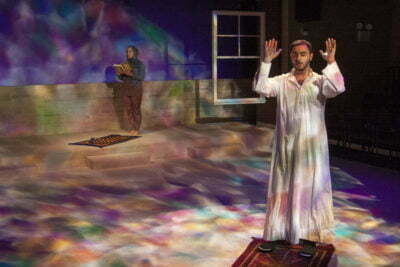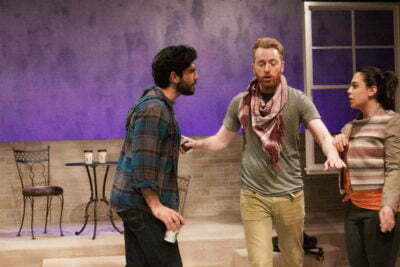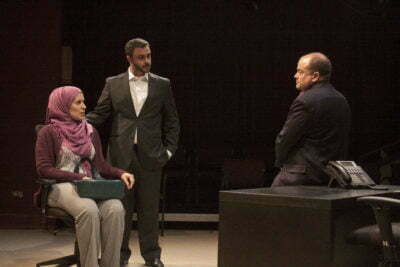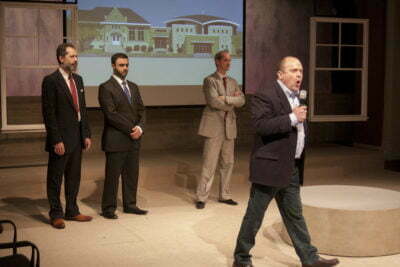Mosque Alert
By Jamil Khoury
Directed by Edward Torres
Produced by Silk Road Rising, Chicago
Play about Islamic Community in America Boasts a Strong Core
Mosque Alert is the result of a massive project which Silk Road Rising has been engaged in for the past five years. Saddened by the opposition to an Islamic cultural center in Manhattan and similar incidents in DuPage County, and by the domination of a very limited number of Muslim voices in the American theatre, Silk Road co-artistic director Jamil Khoury sought input for a story about the construction of a mosque from hundreds of people through online workshops, staged readings, college productions, social media, and other platforms. In the resulting play, he seems to have attempted to represent everyone he met, and his eleven characters each advocate a different set of arguments. It’s unfortunate that such an endeavor would premiere with a rushed staging, which was clearly under rehearsed at opening and struggled to make the leap from web-based content to live action. However, the project is bigger than the production, and in terms of serving a community by providing a discussion forum, the play can be considered a success.

Mostafa Khalil (Frank Sawa) is a Naperville imam and the driving force behind the Al Andalus Library and Community Center, a planned renovation of a historic downtown library. Imam Khalil insists that Muslims need to more actively engage with American society in order to be accepted, and sees this project as a way for them to enter the mainstream on equal terms while retaining their unique culture. But the financial power in the Muslim community comes from Tawfiq Qabbani (Rom Barkhordar), a much more liberal Syrian immigrant who has already assimilated, is living the American Dream, and has clout. Tawfiq meets with Chamber of Commerce director Ted Baker (Mark Ulrich) to smooth over any objections there might be to the new mosque during an early scene which shows both the strengths and weaknesses of Khoury’s script. The writer is representing the complex, often hidden agendas which drive any community, and the way small internal conflicts turn into crises. But once Tawfiq plops an envelope full of cash onto Ted’s desk, we understand both characters, and it isn’t necessary to have them spend five minutes praising themselves for being such smooth operators.

The play follows all three men’s families and the forging and ruining of their friendships as the mosque becomes controversial. Ted’s brother, Daniel (Steve Silver), creates the viciously bigoted website mosquealert.com, which is filled with fear-mongering reports of pregnant Muslim women who fly to America to give birth so their children will be able to carry out attacks without needing passports, and so forth. This naturally causes quite a bit of upset among the Muslims, as well as among Ted’s own family. His college-aged daughter and gay son (Nina Ganet and Riley McIlveen) are quite liberal and believe advocating for Muslims goes along with advocating for women and LGBT equality. Ted’s wife, Emily (Rengin Altay), is good friends with Amina (Rula Gardenier), Tawfiq’s wife, and exposure to the Qabbanis’ kids is why the younger Bakers see Muslims as such natural allies.

But while the Qabbanis’ daughter, Samar (Sahar Dika) believes in her own progressive version of Islam, her brother, Farid (Andrew L. Saenz), has concluded that Islam is unreformable and is uncomfortable with defending it. That may be because he’s spent more time with the Khalil family. The imam’s children are currently in Egypt to be shielded from Western influences, and Mostafa’s wife, Aisha (Amy J. Carle), has long resented living in the United States. She jealously notes that Christians never have to renounce hate to get all sorts of institutional favor, so why do Muslims have to be moderates to get respect?
All of these characters are quite a lot for Khoury to juggle, and I haven’t even mentioned their personal relationships. Not wanting the Muslim community of the larger suburb to be an abstraction, Khoury devotes a great deal of time to examining how their opinions are the result of and inform their experiences. At opening, the cast was still memorizing their lines, which threw off the emotional development of several scenes, but at this point in the run, that problem has most likely been resolved. What won’t change with practice is an underwhelming staging, which relies on a blackout after every scene so a desk and plinth can be moved, and new curtains affixed to the windows to indicate a change in location. But of course, this is an idea-play, not a spectacle.

At the opening night talk-back, many audience members expressed how deeply they’d been moved by recognizing the arguments onstage in their personal lives and the national media. Particularly impacting was Silver’s Daniel, who ends the first act with an anti-Muslim tirade made up of heavily skewed accounts of several conflicts in the twentieth century. People who are not very invested world events would probably have a hard time arguing with him, which is the source of his power. Nobody else in the play is as effective a communicator when put on the spot; the gay activist Carl Baker is bizarrely naïve about how conservative most immigrants and older Muslims are, Imam Khalil is deliberately holding back and holds his own highly biased historical narrative, and a lot of characters just aren’t prepared for a debate about what to do with a lucrative downtown property to turn into an argument over the independence processes and post-colonial conflicts of Israel, India, Algeria, etc. Despite some flaws in its execution, Mosque Alert is significant for its insistence that discussion of Islam’s place in America be reasoned, honest, well-informed, and treat humans as unique individuals instead of abstractions or targets of collective blame. Given how rarely any issue is treated that way, it’s an ambitious goal, but Silk Road is at the forefront of making it happen.Recommended
Jacob Davis
[email protected]
Reviewed April 2, 2016
For more information, see Mosque Alert’s page on Theatre in Chicago.
Playing in Pierce Hall in the Historic Chicago Temple Building, 77 W Washington St, Lower Level, Chicago. Tickets are $25-35; to order, call 312-857-1234×201. Performances are Thursdays at 7:30 pm, Fridays and Saturdays at 8:00 pm, and Sundays at 4:00 pm through May 15. Running time is two hours and twenty minutes with one intermission.

